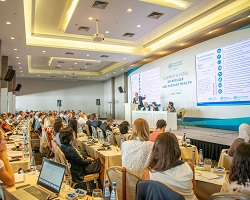WHO launches the third edition of the School on Refugee and Migrant Health, in Cesme, Turkey: From emergency response to long-term inclusion policies

WHO
WHO/Europe is launching its third annual Summer School on Refugee and Migrant Health today in Çeşme, Turkey, under the theme “From emergency response to long-term inclusion policies”. The Summer School is delivered in collaboration with the International Organization for Migration (IOM) and the European Public Health Association (EUPHA). It is a one-of-a-kind opportunity for countries on the front line of migration to access knowledge and share experience to address this growing phenomenon.
“Migration is a defining feature of the 21st century. It is not a crisis or emergency limited in time. Almost 80% of refugees stay in host countries for at least 5 years, over 60% in urban settlements. Structural changes are needed. Local health systems must adapt systematically so that refugees and migrants face fewer financial, administrative, linguistic and cultural barriers to access to health services,” explains Dr Santino Severoni, Coordinator of Migration and Health at WHO/Europe.
“Protecting the health of migrants and refugees is also the best way to protect the health of host populations. The way we respond today will shape the future health-care landscape for Europe, its people and its new arrivals,” he emphasizes.
New evidence discussed at the Summer School
The recently published “Report on the health of refugees and migrants in the WHO European Region” will underpin the knowledge shared at the Summer School. Its findings suggest that migrants and refugees are likely to have good general health, but can be at risk of falling sick in transition or while staying in receiving countries due to poor living conditions or adjustments in their lifestyle.
In particular:
- refugees and migrants appear to be less affected than their host populations by many noncommunicable diseases on arrival; however, if living in conditions of poverty, the duration of their stay in host countries increases their risk for cardiovascular diseases, stroke or cancer; and
- a significant proportion of migrants and refugees affected by communicable diseases acquired the infection after they arrived in Europe – despite the widespread assumption to the contrary, there is only a very low risk of refugees and migrants transmitting communicable diseases to their host population.
This evidence calls on countries to provide timely access to quality health services to migrants and refugees, as to everyone else.
Turkey: a unique model of transition from emergency response to long-term inclusion policies
Host to this edition of the Summer School, the Turkish Government has shown how long-term structural policies can help build a migrant-sensitive response towards universal health coverage.
“With almost 4 million refugees and migrants in the country, the Government of Turkey has guided its response from a humanitarian perspective, but has also understood the need to adapt health systems in the long term, ultimately supporting the inclusion of these vulnerable groups in society,” explains Dr Pavel Ursu, WHO Representative in Turkey.
“At WHO, we welcome this approach in line with the goal of achieving universal health coverage and reaching the United Nation’s Sustainable Development Goals,” he adds.
Since the beginning of the Syrian crisis, language and cultural differences have challenged Syrian refugees’ access to appropriate health information and services in Turkey. WHO has supported the vision of the Turkish Ministry of Health to train and integrate Syrian doctors, nurses and midwives, as well interpreters and community health staff, in the Turkish health system.
More than 2100 Syrian health workers have been trained in 7 refugee health training centres to provide linguistically and culturally sensitive health consultations for their fellow nationals in 178 refugee health centres throughout Turkey. These health workers ensure that refugees receive proper health care and support during referrals to hospitals and specialized services.
WHO European Region inspiring others
Over 80 participants from nearly 20 European countries will attend the Summer School, which will feature close to 35 of the world’s leading experts in the field of refugee and migration health as faculty.
“The work which started in this Region is triggering a worldwide movement – it is inspiring and fostering action to protect the health of refugees and migrants in other regions, too. The recent adoption of the Global Action Plan to Promote the Health of Refugees and Migrants at the Seventy-second World Health Assembly is a solid example,” notes Dr Severoni.
The Summer School for Refugee and Migrant Health includes a site visit to an arrival point for refugees and migrants for a simulation exercise, and a visit to a refugee health training centre.



